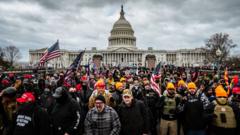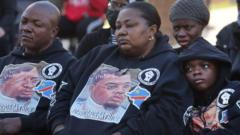The incident raises questions about accountability and the consequences of pardons issued for Capitol riot participants.
Indiana Man Killed by Police Days After Trump Pardon for Capitol Riot Involvement

Indiana Man Killed by Police Days After Trump Pardon for Capitol Riot Involvement
Matthew Huttle, recently pardoned for his role in the January 6 Capitol riots, was shot by police during a traffic stop.
An Indiana resident recently pardoned by former President Donald Trump for his involvement in the January 6 Capitol riots was killed by police in a traffic stop just days later. Matthew Huttle, 42, was shot during an encounter with law enforcement on Sunday after allegedly resisting arrest, according to a statement from the Indiana State Police (ISP). Details surrounding the specific reason for his arrest remain unclear, but police confirmed he was in possession of a firearm at the time.
Huttle was among nearly 1,600 individuals granted clemency by Trump for their actions during the insurrection that saw supporters storm the Capitol building. Following the traffic stop incident, the involved officer has been placed on paid administrative leave as the case is under investigation. Jasper County Sheriff Patrick Williamson emphasized the need for transparency, stating he requested the Indiana State Police to look into the shooting.
Huttle, along with his uncle Dale Huttle, faced legal repercussions after the riot, with Matthew ultimately receiving a six-month prison sentence as a result of a plea agreement. He was released from prison in July 2024. His uncle indicated there were no regrets about their participation, referring to it as a patriotic duty.
This tragic episode is not isolated; concerns have emerged about pardoned rioters facing legal challenges after their release. Daniel Bell, another individual involved in the January 6 riots, was recently re-arrested on federal gun charges, reflecting an unsettling trend among those who participated in the violent events.
Criticism of Trump’s pardoning actions has been voiced by some lawmakers, including Senator Lindsey Graham, who described it as a misstep to pardon individuals who violently assaulted police officers during the Capitol siege, highlighting the complexities surrounding justice for participants in the riots.





















